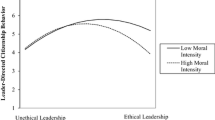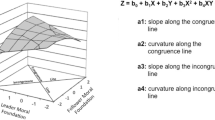Abstract
The authors examined the effects of ethical leadership on follower organizational citizenship behavior (OCB) and deviant behavior. Drawing upon research related to the behavioral plasticity hypothesis, the authors examined a moderating role of follower self- esteem in these relationships. Results from a field study revealed that ethical leadership is positively related to follower OCB and negatively related to deviance. We found that these relationships are moderated by followers’ self-esteem, such that the relationships between ethical leadership and OCB as well as between ethical leadership and deviant behavior are weaker when followers’ self-esteem is high than low. Implications of these findings for research and practice are discussed.
Similar content being viewed by others
References
Aiken, L. S., & West, S. G.: 1991. Multiple regression: Testing and interpreting interactions. Newbury Park, CA: Sage.
Anand, V., Ashforth, B. E., & Joshi, M.: 2004. ‘Business as usual: The acceptance and perpetuation of corruption in organizations’. Academy of Management Executive, 19, 9-23.
Avolio, B. J.: 2007. ‘Promoting more integrative strategies for leadership theory-building.’ American Psychologist, 62, 25-33.
Avolio, B. J. and W. L. Gardner: 2005, `Authentic Leadership Development: Getting to the Root of Positive Forms of Leadership', Leadership Quarterly 16, 315–338
Avolio, B. J., F. W. Walumbwa and T. J. Weber: 2009, `Leadership: Current Theories, Research and Future Directions', Annual Review Psychology 60, 421–490
Bass, B. M.: 1985. Leadership and performance beyond expectations. New York: Free Press.
Bass, B. M., & Steidlmeier, P.: 1999. ‘Ethics, character, and authentic transformational leadership behavior.’ Leadership Quarterly, 10, 181–217.
Brockner, J.: 1988. Self-esteem at work: Research, theory and practice. Lexington, MA: D. C. Heath.
Brown, M. E.: 2007. ‘Misconceptions of ethical leadership: How to avoid pitfalls.’ Organizational Dynamics, 36, 140-155.
Brown, M. E., & Treviño, L. K.: 2006. ‘Ethical leadership: A review and future directions.’ Leadership Quarterly, 17, 595–616.
Brown, M. E., Treviño, L. K., & Harrison, D. A.: 2005. ‘Ethical leadership: A social learning perspective for construct development and testing’. Organizational Behavior and Human Decision Processes, 97, 117–134.
Ciulla, J. B.: 2004. Ethics, the heart of leadership. Santa Barbara, CA: Praeger Publishers.
Conger, J. A., & Kanungo, R. N.: 1998. Charismatic leadership in organizations. Thousand Oaks, CA: Sage.
De Hoogh, A. H. B., & Den Hartog, D. N.: 2008. ‘Ethical and despotic leadership, relationships with leader’s social responsibility, top management team effectiveness and subordinates’ optimism: A multi-method study.’ Leadership Quarterly, 19, 297-311.
Detert, J. R., Treviño, L. K., Burris, E. R., & Andiappan, M.: 2007. ‘Managerial modes of influence and counterproductivity in organizations: a longitudinal business-unit-level investigation.’ Journal of Applied Psychology, 92, 993-1005.
Eden, D., & Kinnar, J.: 1991. ‘Modeling galatea: Boosting self-efficacy to increase volunteering.’ Journal of Applied Psychology, 76, 770-780.
Elengovan, A. R., & Xie, A. J.: 1999. ‘Effects of perceived power of supervisor on the subordinate stress and motivation: The moderating role of subordinate characteristics.’ Journal of Organizational Behavior, 20, 359-373.
Ferris, D. L., D. J. Brown, H. Lian and L. M. Keeping: 2009, ‘When does Self-Esteem Relate to Deviant Behavior? The Role of Contingencies of Self-Worth’, Journal of Applied Psychology 94(5), 1345–1353.
Fox, S., & Spector, P. E.: 1999. ‘A model of work frustration-aggression.’ Journal of Organizational Behavior, 20, 915-931.
Fry, L. W.: 2003. ‘Toward a theory of spiritual leadership.’ Leadership Quarterly, 14, 693–727.
Grojean, M. W., Resick, C. J., Dickson, M. W., & Smith, D. B.: 2004. ‘Leaders, values, and organizational climate: Examining leadership strategies for establishing an organizational climate regarding ethics.’ Journal of Business Ethics, 55, 223–241.
Heider F.: 1958. The Psychology of Interpersonal Relations. Wiley: New York.
Howell, J. M., & Shamir, B.: 2005. ‘The role of followers in the charismatic leadership process: Relationships and their consequences.’ Academy of Management Review, 30, 96-112.
Hu, L., & Bentler, P. M.: 1999. ‘Cutoff criteria for fit indices in covariance structure analysis: conventional criteria versus new alternatives.’ Structural Equation Modeling , 61, 1–55.
Judge, T.A., Erez, A., Bono, J.E., & Thoresen, C.J.: 2003. ‘The core self-evaluations scale: Development of a measure.’ Personnel Psychology, 56, 303-331.
Judge, T. A., & Piccolo, R. F.: 2004. ‘Transformational and transactional leadership: A meta-analytic test of their relative validity.’ Journal of Applied Psychology, 89, 755–767.
Lee, K., & Allen, N. J.: 2002. ‘Organizational citizenship behavior and workplace deviance: The role of affect and cognitions.’ Journal of Applied Psychology, 87, 131-142.
Liden, R. C., & Antonakis, J.: 2009. ‘Considering context in psychological leadership research.’ Human Relations, 62, 1587-1605.
Mayer, D. M., Kuenzi, M., Greenbaum, R., Bardes, M., & Salvador, R.: 2009. ‘How low does ethical leadership flow? Test of a trickle-down model’. Organizational Behavior and Human Decision Processes, 108, 1-13.
Neubert, M. J., D. S. Carlson, K. M. Kacmar, J. A. Roberts and L. B. Chonko: 2009. ‘The Virtuous Influence of Ethical Leadership Behavior: Evidence from the Field’, Journal of Business Ethics 90, 157–170
Palanski, M. E. and F. J. Yammarino: 2007, ‘Integrity and Leadership: Clearing the Conceptual Confusion’, European Management Journal 25, 171–184.
Palanski, M. E., & Yammarino, F. J.: 2009. ‘Integrity and leadership: A multi-level conceptual framework.’ Leadership Quarterly, 20, 405-420.
Piccolo, R. F., Greenbaum, R., Den Hartog, D. N., & Folger, R.: 2010. ‘The relationship between ethical leadership and core job characteristics.’ Journal of Organizational Behavior, 31, 259–278.
Pierce, J. L., Gardner, D. G., Dunham, R. B., & Cummings, L. L.: 1993. ‘Moderation by organization-based self-esteem of role condition-employee response relationships’, Academy of Management Journal, 36, 271-288.
Podsakoff, P. M., S. C. MacKenzie, J. Lee and N. P. Podsakoff: 2003, `Common Method Biases in Behavioral Research: A Critical Review of the Literature and Recommended Remedies', Journal of Applied Psychology 88, 879–903
Saks, A. M., & Ashforth, B. E.: 2000. ‘The role of dispositions, entry stressors, and behavioral plasticity theory in predicting newcomers’ adjustment to work.’ Journal of Organizational Behavior, 21, 43-62.
Treviño, L. K., Weaver, G. R., & Reynolds, S. J.: 2006. ‘Behavioral ethics in organizations: A Review.’ Journal of Management, 32, 951-990.
Van Dyne, L., & Pierce, J. L. : 2004. ‘Psychological ownership and feelings of possession: three field studies predicting employee attitudes and organizational citizenship behaviors.’ Journal of Organizational Behavior, 25, 439-459.
Van Dyne, L., VandeWalle, D., Kostova, T., & Cummings, L. L.: 2000. ‘Collectivism, propensity to trust and self-esteem as predictors of organizational citizenship in a non-work setting.’ Journal of Organizational Behavior, 21, 3–23.
Walumbwa, F. O., Avolio, B. J., Gardner, W. L., Wernsing, T. S., & Peterson, S. J.: 2008. ‘Authentic leadership: Development and validation of a theory-based measure.’ Journal of Management, 34(1), 89-126.
Walumbwa, F. O., & Schaubroeck, J.: 2009. ‘Leader personality traits and employee voice behavior: Mediating roles of ethical leadership and work group psychological safety.’ Journal of Applied Psychology, 94, 1275-1286.
Weick, K.E.: 1988. ‘Enacted sensemaking in crisis situations.’ Journal of Management Studies, 25, 305-317.
Author information
Authors and Affiliations
Corresponding author
Rights and permissions
About this article
Cite this article
Avey, J.B., Palanski, M.E. & Walumbwa, F.O. When Leadership Goes Unnoticed: The Moderating Role of Follower Self-Esteem on the Relationship Between Ethical Leadership and Follower Behavior. J Bus Ethics 98, 573–582 (2011). https://doi.org/10.1007/s10551-010-0610-2
Published:
Issue Date:
DOI: https://doi.org/10.1007/s10551-010-0610-2




